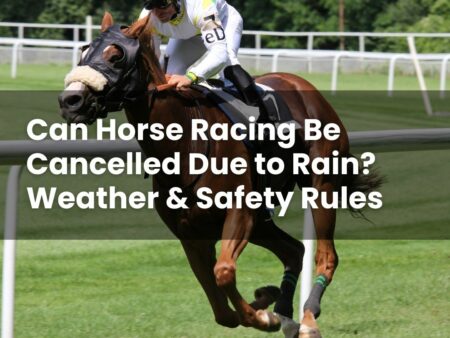Horse racing is a well-known part of British sport, with events drawing large crowds and wide interest. Yet, even with months of planning, some race days do not go ahead as scheduled.
You might be curious about the reasons behind these cancellations, especially if you have seen races suddenly disappear from the schedule.
This blog explores some of the common causes behind horse racing cancellations in the UK. By looking at the key factors, you can gain a clearer understanding of why organisers decide to call off a meeting. This can help you stay informed if you follow or are interested in horse racing.
What Causes Horse Racing To Be Cancelled?
There are several factors that can lead to horse racing being called off in the UK. Understanding these reasons shows how much goes on behind the scenes to keep racing safe for both horses and people. The sections below set out some of the most common causes and the considerations stewards weigh up on the day.
Weather Conditions And Track Safety
Weather in the UK can be unpredictable, especially in winter. Persistent rain can leave the track waterlogged, which increases the risk of slips and falls. Frozen ground, heavy snowfall or high winds can also make a meeting too dangerous to run, particularly where visibility or obstacles are affected.
Every track is inspected before a meeting. If the surface is too soft, too hard or too slippery, stewards can postpone or cancel races. Racecourses invest in drainage, frost covers and track maintenance to try and reduce disruption, but severe conditions can still prevent safe racing. Descriptions of the going, such as soft, heavy or firm, help guide these decisions and reflect whether the surface may be suitable for the horses.
Animal Welfare And Health Concerns
Welfare sits at the heart of UK racing. If there is a risk of disease spreading, for example an equine influenza outbreak, races can be postponed or cancelled to protect the wider horse population. Vets and trainers also assess whether conditions on the day could harm horses, such as extremes of temperature or a rapidly spreading illness in the stable area.
If welfare standards cannot be met, the meeting does not take place. This can include biosecurity measures not being possible, inadequate isolation facilities or any concerns raised during pre-race checks.
Operational Or Technical Issues On Race Day
Sometimes cancellations come down to logistics rather than the weather. A major power cut can affect timing, photo-finish cameras or safety systems. Transport problems, such as blocked access roads or multiple horsebox breakdowns, can stop runners, officials or medical teams from arriving in time.
Equipment failure can also play a part. Starting stalls that cannot be used safely, a damaged running rail or issues with communication systems can all disrupt a card. If these problems cannot be fixed promptly, organisers are left with little choice but to call the meeting off.
Safety Regulations And Steward Decisions
Races are overseen by stewards whose role is to keep events fair and safe. The British Horseracing Authority (BHA) sets rules on everything from track standards and medical cover, to starting procedures. If the required safety measures are not in place, the meeting is postponed or cancelled.
Stewards can also stop a race day if they judge it unsafe for jockeys, horses, staff or spectators. This might involve concerns about barriers or starting gates, inadequate ambulance cover, poor visibility in thick fog or defective safety equipment. When the evidence points to increased risk, the decision errs on the side of caution.
With the reasons clear, the next question is how that decision reaches everyone who planned to watch or attend.
How Racecourses Communicate Cancellations To Fans And Bettors
When a horse racing event is cancelled in the UK, racecourses share the news quickly through official channels. Updates are posted on their websites and social media, and ticket holders often receive emails or texts. On race mornings, recorded messages or staff at the racecourse office can provide the latest status.
Racing news outlets and television coverage also report changes to the schedule. If you follow a particular meeting, checking these sources shortly before the first race can help you stay up to date.
Bettors who have placed wagers with online bookmakers usually see notifications in their account areas, and race statuses should be updated within market lists. This keeps the betting side aligned with official announcements.
What Happens To Bets When Horse Racing Is Cancelled?
If a race meeting is cancelled before it starts, most UK bookmakers void bets on that race. Voiding means your stake is refunded to your account, as if the bet was never placed.
For multiples, only the cancelled leg is voided and the remaining selections continue. For example, if one race in a four-fold is called off, that part is removed and the bet becomes a treble.
Betting exchanges, where customers wager against one another, can apply different rules, so it can be worth checking the terms and conditions for the site you use, especially for less typical situations.
Can Horse Racing Be Rescheduled After A Cancellation?
Some UK horse racing events are rescheduled after a cancellation, particularly when the cause is short term, such as a cold snap or heavy rain. Whether a meeting gets a new date depends on the wider fixture list, the state of the track and the availability of officials, medical cover and facilities. In some cases the races might move to a different course if that allows them to go ahead safely.
Not every cancelled fixture returns to the calendar. High-profile races are more likely to be rearranged, while smaller meetings can be lost from the season. When a meeting is rescheduled, bookmakers update their event lists and markets, so you can see the new date and details.
Knowing why cancellations happen, how updates are shared and what it means for any bets can help increase your understanding. If you choose to bet, only stake what you can afford and use the safer gambling tools available. Always gamble responsibly.








